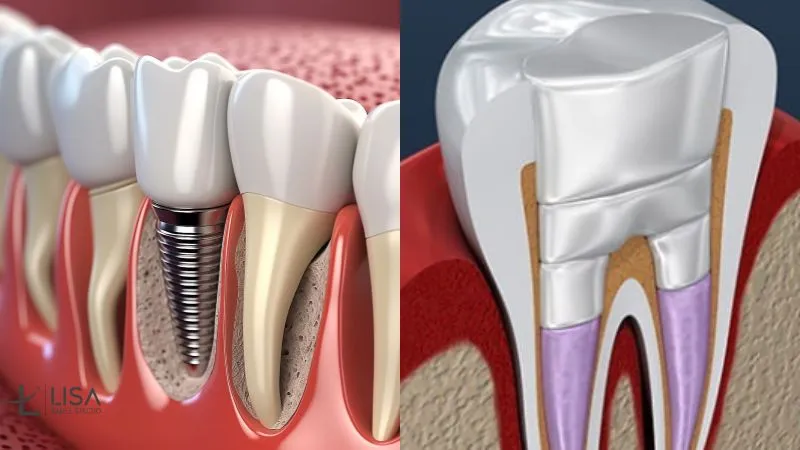Root canal vs Implant pros and cons
Dental implant vs. root canal treatment is a common dilemma, and a tooth implant should be your choice. This blog discusses the pros and cons of both treatments and explains why implant treatment is a more advantageous choice. You can select the method that best suits your needs by examining them and seeking advice from your dentist.

Dental Implant
If you have advanced caries and an infection extending to the roots of the teeth, you can solve this either with root canal treatment or tooth extraction. The cavity created as a result of tooth extraction can cause problems such as alignment problems, incorrect biting, abrasion, or slippage of the teeth. The best method to prevent this is to have an implant.
During this process, a titanium screw that is compatible with your body is placed in your gum. Then the abudment and tooth crown are attached on top. In this way, you have a very strong artificial tooth.
Pros
Success rate: It is reassuring for patients, as the probability of failure (2%) is very low. Even patients with poor bone density in the jaw can have implants with additional treatment methods.
Aesthetic appearance: You can choose the colour of artificial teeth in the colour of your existing teeth, just like veneers, and provide a natural tooth appearance. With the appearance they provide, your teeth look almost indistinguishable from your natural teeth. This provides patients with self-confidence and an aesthetic appearance.
Ease of use: You can use artificial teeth as comfortably as your other teeth and continue with your old diet. These teeth do not move while eating or talking. This increases the patient's comfort of life very much.
Treatment duration: The duration of treatment varies according to the patient but takes several months. However, the first healing period, when the wounds heal, is one week. After this period, patients can easily return to their daily lives and do not experience any aesthetic problems.
One session: With the latest developments, implant treatment has become possible in 1 day. Patients can come to Turkey from abroad and have their implants done and return on the same day.
Longevity: This treatment is long-lasting, and patients can use their teeth for at least 10 years. If the screws are intact, it is possible to replace them when the tooth parts wear out.
Cons
Cost: This treatment is more expensive than root canal treatment due to the materials used. However, if you get implant treatment in Turkey, you can pay approximately the same price as root canal treatment in the UK.
Root Canal Treatment
In root canal treatment, after the infection in the root and pulp is completely cleaned, the hollow root is dried. Then, the cavity is filled with filling material and sealed with a dental crown. This is a laborious and time-consuming treatment.
Pros
Cost: It is a more affordable treatment since the natural tooth is treated and there is no need for high-cost materials.
Healing time: Since root canal treatment is less invasive, it heals within a few days.
Natural teeth: The natural tooth remains in place and continues to fulfil its function in the mouth. This is a great advantage. The only problem is that these teeth are no longer as strong as before and are more susceptible to breakage and infection.
Cons
Treatment time: More than one session is needed for the treatment, and this can be a disadvantage for patients who have a busy life or work.
Success rate: The success rate is not as high as with implants. If the treatment is unsuccessful, you may need additional treatments. After treatment, your tooth may become more sensitive, and you may experience tooth loss.
Damage detection: During treatment, unpredictable damage to the inside of the tooth can be detected. This may adversely affect the success of root canal treatment.
Dental implant or root canal treatment: Which one should I choose?
When the issue of is evaluated, it is seen that implant treatment has more positive aspects. Dental implants are frequently preferred by patients due to their benefits, success rate, and durability.
Although root canal treatment is a more cost-effective option, complaints are likely to continue. The fact that the tooth becomes more susceptible to infection and tooth loss puts this treatment on the back burner over time.

